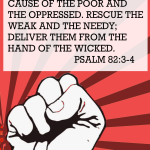Counting the Cost: True Discipleship and the Challenge of Grace
Sermon on Luke 14:25-33 Inspired by Bonhoeffer’s “The Cost of Discipleship”
Introduction
To openly be a Christian in first century Palestine, following Jesus’ death could mean a death sentence and one that was not taken lightly. Jesus’ followers by all accounts prior to the church councils did not see the same divinity in him that the later church fathers did. Jesus was a Jewish male who took his Judaism seriously, particularly his emphasis on the poor and marginalized, perhaps reflecting on his own poor and marginalized status in his society. We are told in a variety of sources how the early Christians met in secret.
There was a seriousness to the Way of Christ that was society building for the early followers. They looked out for each other, and we are told that their movement grew day by day. One thing that I learned in my studies is that these stories were not written for us modern “Christians”. In many ways, modern “Christians” have lost the seriousness of being a Christian. They display what Dietrich Bonhoffer calls a “cheap grace” and they now worry about the importance of corporate logos rather than the poor and marginalized in their midst.
In the theme I have been writing on from the lectionary in the last month, I want to continue looking at this them of detachment.
The Radical Call of Jesus (Luke 14:25-27)
Jesus was a no body from nowhere. Galilee was smaller than Miller Station. Just a small bump on the road. However, Jesus spoke to large crowds. He did this not because he was interested in popularity, but in truth. Jesus challenges us to pray in secret and this is a clue to his agenda. He drops a truth bomb on us that has been taken wildly out of context ever since it was translated to English. Jesus presents us with the shocking command that “If anyone comes to me and does not hate father and mother, wife and children… cannot be my disciple.” In my lectio, I was very curious about this as I had never really dug into this wording in all the times I have preached before.
In the historical context, the word we translate to “hate”, means “love less. Hate is a Semitic idiom that means to “love less” or “put into second place”. Here, Jesus is not calling for animosity within families, but for radical priority—God above all else. The bible both in the old and new testaments is replete with examples of characters doing this: Abraham called to leave his family; the disciples leaving their nets.
The key point here is that discipleship means ultimate allegiance. God’s call comes before every other love and loyalty. This is a loyalty over corporate logos, our feelings of superiority and loyalty over fear of the other, something that is infecting our country daily.
Dietrich Bonhoeffer and the Cost of Discipleship
Dietrich Bonhoeffer was a German pastor, theologian, and anti-Nazi dissident whose life and work have left an indelible mark on Christian thought and practice. Born in 1906, Bonhoeffer became renowned for his deep commitment to living out the radical teachings of Jesus, even when it meant opposing the prevailing powers of his time. As a founding member of the Confessing Church, he spoke out boldly against the compromises of the German church under Hitler, calling for a faith that would not bow to political or social expediency. His involvement in resistance activities ultimately led to his imprisonment and execution in 1945, making him a modern martyr for the cause of costly discipleship. Bonhoeffer’s writings, especially “The Cost of Discipleship,” continue to challenge Christians to embrace a faith that is authentic, courageous, and deeply concerned with justice.
Bonhoeffer in his book, “The Cost of Discipleship” offers us the concept of cheap grace vs. Costly grace. Here, he is critiquing the heart of our modern Christian dilemma: the tendency to water down discipleship until it becomes unrecognizable from the radical invitation of Jesus.
As noted earlier, the early followers of Jesus risked everything to go against the Roman system and their occupations, often leading to violent deaths. If the early followers risked everything to live out his teachings, today’s challenge is subtler yet equally demanding—identifying and forsaking the comforts and loyalties that dilute our devotion. Rather than seeing grace as a license for complacency, Bonhoeffer insists we rediscover its weight: a grace that is as costly as it is transformative, calling us to live not for self-preservation but for the sake of the gospel and the neighbor. This means wrestling with the implications of what we cherish and whom we serve, recognizing that authentic discipleship is not measured by public displays or institutional affiliation, but by the willingness to reorder our lives in pursuit of justice and mercy. In this light, Jesus’ commands become not merely historical challenges but daily reckonings, urging us to examine what keeps us from full surrender and to seek a faith that is lived with integrity, courage, and sacrificial love.
Briefly –
Cheap Grace is Christianity as a brand, a social belonging or a moral cover. Christian in name only. It preaches a forgiveness or a gospel message without adhering to the risk of going to the cross. It is cross witnessing without cross bearing.
On the other hand, costly grace is grace that demands everything. It’s free, but not cheap. When Christ calls us to be disciples, we witness to the cross and the love of Christ and we bear the cross with Christ. It means real discipleship: surrender, sacrifice and living for others.
“Carrying the Cross” in Our Time (Luke 14:27-33)
When we are cross bearers, we begin to prioritize certain commitments or values over comfort, status, or possessions. For our contemporary context, we are told that economic success, corporate brands, political identity, or family may be viewed as significant priorities. Being a disciple, as a cross bearer however, we are challenged to place as Bonhoeffer asserts that authentic discipleship entails aligning oneself with marginalized individuals rather than those in positions of power. He contends that Christianity is frequently appropriated by concerns such as commercial interests, the pursuit of success, nationalism, or institutional authority. In contrast, Jesus’ ministry demonstrated a profound commitment to compassion for the poor, the outcast, and vulnerable members of society.
In Closing
We must ask ourselves, how does following Christ really change what we value? To be a disciple means counting the cost—and choosing what is truly valuable. Bonhoeffer’s challenge: Will we settle for cheap grace, or will we walk the way of costly grace, loving Christ above all and standing with the least of these? Will we become witnesses to the cross and bear the cross at the same time? Are we more concerned with our brand, our appearance, our comfort—or with the needs of the poor and defenseless?
Practically, we can begin engaging in more costly grace by engaging in broader practices of generosity, finding places in our daily lives, our work and play spaces where we can engage in advocacy. We can spend time seeking out and listening to the voiceless.













